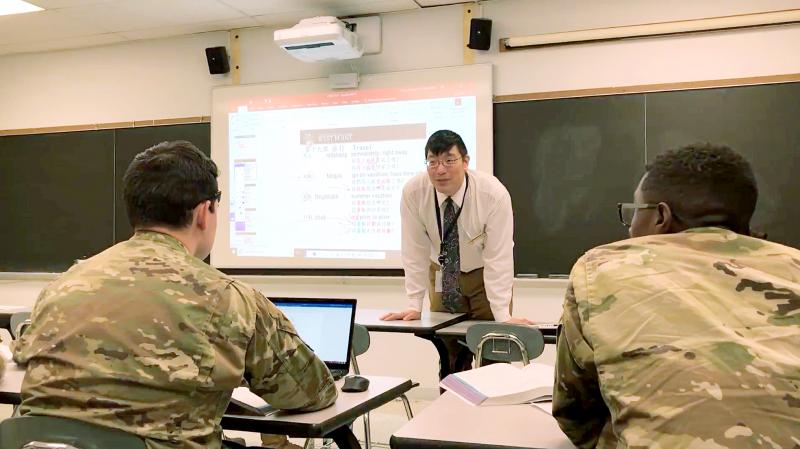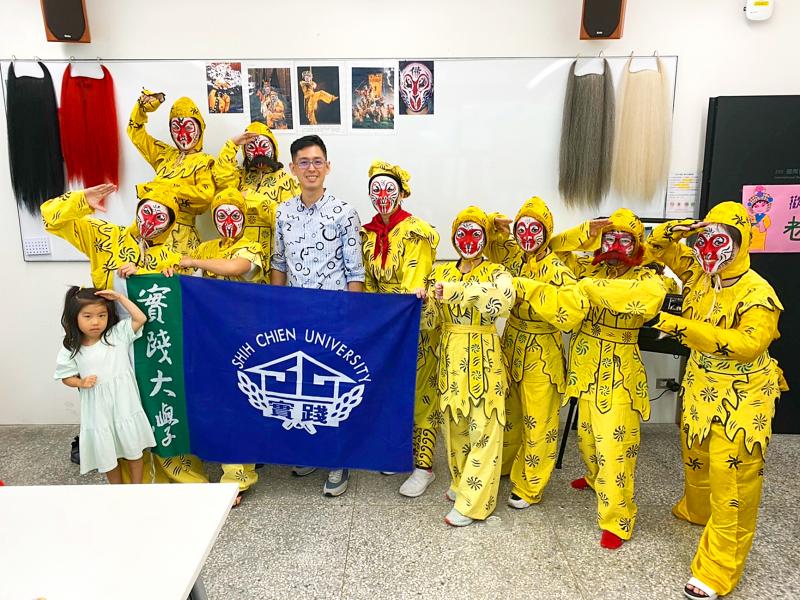Most US students take Chinese classes because they want to know more about China, but Taiwanese teachers can make a change with more flexible pedagogic approaches and cultural exchanges, two local teachers said.
Since the US last year canceled its Fulbright programs with China and Hong Kong, Taiwan has been granted a larger quota of scholarships, including the Foreign Language Teaching Assistant Fulbright Program, which is funded by the US Department of State and comanaged in Taiwan by the Foundation for Scholarly Exchange.
American Institute in Taiwan Director Brent Christensen last month encouraged Taiwan to fill the gap left by the closures of China’s Confucius Institutes in the US, saying that it is an opportunity for Taiwanese to teach Mandarin and learn English, and to comprehensively tell Taiwan’s story to students in the US.

Photo courtesy of Michael Chang
Michael Chang (張傳聖), a scholarship recipient for the 2018-2019 academic year, shared the fun and challenges he had when teaching Mandarin at the US Military Academy at West Point in New York State.
“My biggest challenge was to help the cadets learn the language from scratch amid their busy curricula and military drills,” he told the Taipei Times in an interview last month.
Chang was no stranger to teaching Mandarin to foreign students. Before and after he visited the US, he has been teaching at National Taiwan University’s International Chinese Language Program (ICLP), which was established in 1962.

Photo courtesy of Chou Yi-yi
Chang said that West Point’s foreign languages department has been offering Mandarin classes for two or three decades, so he could follow its well-established curriculum with designated materials.
The cadets learned traditional characters before simplified ones, which made it easier for them, he added.
Although he taught beginner-level students, Chang said that he saw that students in higher-level classes were required to read Mandarin-language newspapers, such as China’s People’s Daily, to practice “textual analysis.”
Everything at the military academy is designed for purpose, just as Mandarin is one of eight languages taught there, alongside French, Spanish, Portuguese, German, Russian, Arabic and Persian, he said, adding that Japanese is taught at naval institutions elsewhere in the US.
Asked if he tried to distinguish his teaching style from that of Chinese teachers, Chang said that it is pedagogy — not nationality — that distinguishes good teachers from bad ones.
While he did not have much leeway to offer additional materials in class, some people who knew his background asked about his opinion on Taiwanese history and politics, the US’ Indo-Pacific Strategy and China’s actions in Hong Kong, he said.
Chang had worked at Chinese University of Hong Kong and obtained a master’s degree in history from National Tsing Hua University.
Referring to his time at West Point, Chang said that “Taiwanese can play a vital role as cultural ambassadors by exchanging views with their colleagues and friends.”
However, the friendships were difficult to sustain, as the program only covered his stay for nine months, Chang said.
For Taiwan and the US to fortify their partnership in the field of education, Chang suggests that there should be programs that combine language teaching with courses for academic degrees.
Similarly, some teachers from China continued their education at US institutions after leaving their work at a Confucius Institute in the country, he said.
How long the Mandarin-learning trend can last partially depends on the development of US-China relations, ICLP director Kao Wei-hung (高維泓) said, adding that Taiwan has for the past decade not been the top destination of Mandarin learners.
The ICLP admits students with at least intermediate levels in Mandarin, and it offers the most solid, as well as most expensive, courses among similar centers in Taiwan, Kao said.
People with advanced Mandarin skills are likely to become influential, for example as diplomats, sinologists and business leaders, he added.
Another Taiwanese Fulbright scholarship recipient, Chou Yi-yi (周怡怡), who served as a teaching assistant to a teacher from China at the University of Wyoming, had different experiences.
Her job was to assist the female teacher with grading students’ assignments and preparing teaching materials, Chou said.
Most of the students at the university took a Mandarin course because they were interested in getting to know China, their parents had businesses in China, or they had Chinese friends, Chou said.
The Chinese teacher had taught at the school for 17 years and would take her students on a trip to China in their fifth semester, for which they would also receive credit points, she said.
Their cooperation was fine at the beginning, but after the Chinese teacher found out that she had participated in human rights campaigns, the teacher started to prevent her from having too much interaction with the students, Chou said.
However, thanks to the Fulbright program’s reputation, she had other opportunities to network with academics and join extracurricular activities, Chou said.
Before she joined the program, Chou had often traveled to the US with her family. She obtained her master’s degree in childhood education from the New York Institute of Technology, and interned at elementary and junior-high schools there.
Her children started going to schools in New York in 2014, and she has seen how they struggled with white people’s racial prejudices against Asians, Chou said.
“There is very little children can do in such situations. The key is to change adults,” Chou said.
Her children’s painful experience motivated her to pursue a Mandarin-teaching career and promote Taiwanese culture abroad, she said.
Now teaching Mandarin at Shih Chien University, Chou emphasizes speaking and listening activities.
Most of her students come from other Asian countries, such as South Korea, Japan, Vietnam and Thailand, and “speaking for survival” is their main objective, Chou said.
To help students better adapt to daily life in a Mandarin-speaking environment, she invited people with different occupations, for example postal workers, to tell their students about their jobs, and she also guided them to search information about feng shui — an ancient Chinese belief that a person’s surroundings influence their energy and fortune, Chou said.
Some students also asked her for help to cope with racial prejudice that some Taiwanese officials show toward Southeast Asians, she added.
To type in Mandarin, in addition to the Hanyu Pinyin system, which is more widely used in other parts of the world, Chou also teaches her students “bopomofo,” as she said it is inseparable from daily life in Taiwan.
Ahead of the Lunar New Year holiday, Chou also wrote spring couplets and made dumplings with her students.
“Language is never simply a language. It carries cultural implications,” Chou said. “Students will continue to learn a language only when they are interested in the culture behind it.”

SHIPS, TRAINS AND AUTOMOBILES: The ministry has announced changes to varied transportation industries taking effect soon, with a number of effects for passengers Beginning next month, the post office is canceling signature upon delivery and written inquiry services for international registered small packets in accordance with the new policy of the Universal Postal Union, the Ministry of Transportation and Communications said yesterday. The new policy does not apply to packets that are to be delivered to China, the ministry said. Senders of international registered small packets would receive a NT$10 rebate on postage if the packets are sent from Jan. 1 to March 31, it added. The ministry said that three other policies are also scheduled to take effect next month. International cruise ship operators

HORROR STORIES: One victim recounted not realizing they had been stabbed and seeing people bleeding, while another recalled breaking down in tears after fleeing A man on Friday died after he tried to fight the knife-wielding suspect who went on a stabbing spree near two of Taipei’s busiest metro stations, Taipei Mayor Chiang Wan-an (蔣萬安) said. The 57-year-old man, identified by his family name, Yu (余), encountered the suspect at Exit M7 of Taipei Main Station and immediately tried to stop him, but was fatally wounded and later died, Chiang said, calling the incident “heartbreaking.” Yu’s family would receive at least NT$5 million (US$158,584) in compensation through the Taipei Rapid Transit Corp’s (TRTC) insurance coverage, he said after convening an emergency security response meeting yesterday morning. National

PLANNED: The suspect visited the crime scene before the killings, seeking information on how to access the roof, and had extensively researched a 2014 stabbing incident The suspect in a stabbing attack that killed three people and injured 11 in Taipei on Friday had planned the assault and set fires at other locations earlier in the day, law enforcement officials said yesterday. National Police Agency (NPA) Director-General Chang Jung-hsin (張榮興) said the suspect, a 27-year-old man named Chang Wen (張文), began the attacks at 3:40pm, first setting off smoke bombs on a road, damaging cars and motorbikes. Earlier, Chang Wen set fire to a rental room where he was staying on Gongyuan Road in Zhongzheng District (中正), Chang Jung-hsin said. The suspect later threw smoke grenades near two exits

The Forestry and Nature Conservation Agency yesterday launched a gift box to market honey “certified by a Formosan black bear” in appreciation of a beekeeper’s amicable interaction with a honey-thieving bear. Beekeeper Chih Ming-chen (池明鎮) in January inspected his bee farm in Hualien County’s Jhuosi Township (卓溪) and found that more than 20 beehives had been destroyed and many hives were eaten, with bear droppings and paw prints near the destroyed hives, the agency said. Chih returned to the farm to move the remaining beehives away that evening when he encountered a Formosan black bear only 20m away, the agency said. The bear